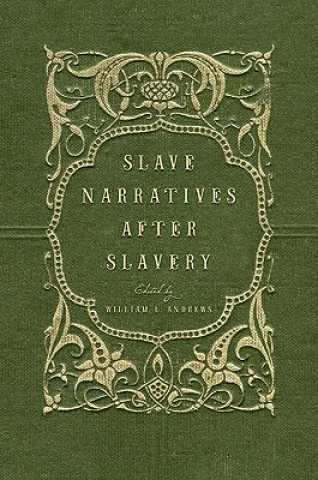
Kód: 04516578
Slave Narratives after Slavery
Autor William L. Andrews
The pre-Civil War autobiographies of famous fugitives such as Frederick Douglass, William Wells Brown, and Harriet Jacobs form the bedrock of the African American narrative tradition. After emancipation arrived in 1865, former sl ... celý popis
- Jazyk:
 Angličtina
Angličtina - Väzba: Brožovaná
- Počet strán: 456
Nakladateľ: Oxford University Press Inc, 2011
- Viac informácií o knihe

Mohlo by sa vám tiež páčiť
-

Dune
10.52 € -14 % -

Haunting Adeline
30.76 € -

Berserk Deluxe Volume 2
52.64 € -

White Nights
3.57 € -24 % -

Powerless
11.95 € -8 % -

Atomic Habits
15.94 € -15 % -

Dune Messiah
8.99 € -20 % -

Berserk Deluxe Volume 3
52.64 € -

One Day
12.57 € -13 % -

Berserk Deluxe Volume 1
51.01 € -

Iron Flame
16.25 € -19 % -

Surrounded by Idiots
11.75 € -21 % -

Harry Potter and the Prisoner of Azkaban (Minalima Edition)
27.19 € -33 % -

Gravity Falls Journal 3
22.07 € -

Heaven Official's Blessing: Tian Guan Ci Fu (Novel) Vol. 1
21.46 € -

The Creative Act
24.02 € -13 % -

Dune
9.60 € -20 % -

Hunting Adeline
31.79 € -

A Little Life
17.47 € -

Children of Dune
8.78 € -22 % -

Heaven Official's Blessing: Tian Guan Ci Fu (Novel) Vol. 2
22.07 €
Darčekový poukaz: Radosť zaručená
- Darujte poukaz v ľubovoľnej hodnote, a my sa postaráme o zvyšok.
- Poukaz sa vzťahuje na všetky produkty v našej ponuke.
- Elektronický poukaz si vytlačíte z e-mailu a môžete ho ihneď darovať.
- Platnosť poukazu je 12 mesiacov od dátumu vystavenia.
Viac informácií o knihe Slave Narratives after Slavery
Nákupom získate 148 bodov
 Anotácia knihy
Anotácia knihy
The pre-Civil War autobiographies of famous fugitives such as Frederick Douglass, William Wells Brown, and Harriet Jacobs form the bedrock of the African American narrative tradition. After emancipation arrived in 1865, former slaves continued to write about their experience of enslavement and their upward struggle to realize the promise of freedom and citizenship. Slave Narratives After Slavery reprints five of the most important and revealing first-person narratives of slavery and freedom published after 1865. Elizabeth Keckleys controversial Behind the Scenes (1868) introduced white America to the industry and progressive outlook of an emerging black middle class. The little-known Narrative of the life of John Quincy Adams, When in Slavery, and Now as a Freeman (1872) gave eloquent voice to the African American working class as it migrated from the South to the North in search of opportunity. William Wells Browns My Southern Home (1880) retooled the image of slavery delineated in his widely-read antebellum Narrative and offered his reader a first-hand assessment of the South at the close of Reconstruction. Lucy Ann Delaney used From the Darkness Cometh the Light (1891) to pay tribute to her enslaved mother and to exemplify the qualities of mind and spirit that had ensured her own fulfillment in freedom. Louis Hughess Thirty Years a Slave (1897) spoke for a generation of black Americans who, perceiving the spread of segregation across the South, sought to remind the nation of the horrors of its racial history and of the continued dedication of the once enslaved to dignity, opportunity, and independence.
 Parametre knihy
Parametre knihy
Zaradenie knihy Knihy po anglicky Humanities History History: specific events & topics
59.90 €
- Celý názov: Slave Narratives after Slavery
- Autor: William L. Andrews
- Jazyk:
 Angličtina
Angličtina - Väzba: Brožovaná
- Počet strán: 456
- EAN: 9780195179439
- ISBN: 0195179439
- ID: 04516578
- Nakladateľ: Oxford University Press Inc
- Hmotnosť: 594 g
- Rozmery: 234 × 164 × 29 mm
- Dátum vydania: 16. June 2011
Osobný odber Bratislava a 2642 dalších
Copyright ©2008-24 najlacnejsie-knihy.sk Všetky práva vyhradenéSúkromieCookies



 21 miliónov titulov
21 miliónov titulov Vrátenie do mesiaca
Vrátenie do mesiaca 02/210 210 99 (8-15.30h)
02/210 210 99 (8-15.30h)